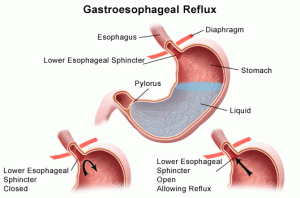Esophagitis is an inflammation of the lining of the esophagus, the tube that connects the throat to the stomach. There are 2 types of the disorder: reflux and infectious esophagitis.
Reflux Esophagitis
Reflux esophagitis, the more common type is also called GERD (gastroesophageal reflux disease). It occurs when acid from the stomach flows back into the esophagus. This happens repeatedly and leads to irritation.
Causes of Reflux Esophagitis:
- Being overweight
- Pregnancy
- Frequent vomiting
- Certain medications (such as aspirin and other anti-‐inflammatories)
- Hiatal hernia—when the upper part of the stomach pushes upward through the diaphragm (the muscle between the chest and the abdomen)
Infectious Esophagitis
Infectious esophagitis is caused by an infection. Certain factors can make infection more likely, including a weakened immune system and poor nutrition. Antibiotic use can also be a factor.
Infectious esophagitis is often due to the following:
- Fungus (typically candida)
- Virus, such as herpes simplex virus 1 or cytomegalovirus (CMV)
Symptoms of Esophagitis
The following symptoms can occur for both types of esophagitis:
- Pain when swallowing, or trouble swallowing
- Heartburn (pain behind the breastbone)
- Nausea
- Bleeding (indicated by bright red vomit or black, tarry stool)
These symptoms occur more often with Reflux Esophagitis:
- Coughing
- Hoarseness
Diagnosing Esophagitis
The following tests can be used for diagnosing esophagitis:
- Upper endoscopy, allowing your doctor to look for damage and take a biopsy sample if needed.
- Upper GI x-ray with barium
Treatment of Esophagitis
Medications can help treat either type.
- For infectious esophagitis, medications can help clear the infection.
- For reflux esophagitis, medications are prescribed based on symptoms, such as antacids taken at meals and bedtimes for minor symptoms, or medications to reduce stomach acid for more severe symptoms.
- Other medications can help food move through the stomach more quickly.
Lifestyle changes can help reduce irritation and ease symptoms:
- Avoiding spicy foods (pepper, chili powder, curry), hard foods (nuts, crackers, raw vegetables) and acidic foods and drinks (tomatoes, citrus fruits and juices).
- Other problem foods include chocolate, peppermint, nutmeg and foods high in fat.
- Until you can swallow without pain, follow a combined liquid and soft diet. Try foods such as cooked cereals, mashed potatoes and soups.
- Take small bites and chew your food thoroughly.
- Avoid large meals. And don’t eat right before lying down.
- Get to or maintain a healthy weight.
- Avoid alcohol, caffeine and smoking.
- Practice good oral hygiene.
- Raise your upper body by 4 to 6 inches when lying in bed. This can be done using a foam wedge or putting blocks under the legs at the head of your bed.
Surgery may be needed for severe Reflux Esophagitis
Without treatment, esophagitis can worsen. This is especially true with severe reflux esophagitis. Continued symptoms can cause scarring of the esophagus and, over time, a stricture or narrowing. This can result in trouble passing food down to the stomach. Continued symptoms can also cause changes in the lining of the esophagus and put you at a slightly higher risk of cancer of the esophagus.

